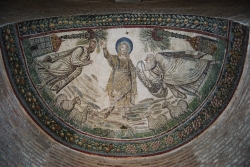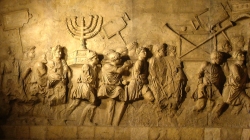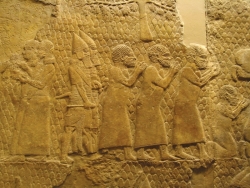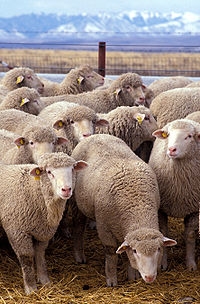
 |
| Torâh | Haphtârâh | Âmar Ribi Yᵊhoshua | Mᵊnorat ha-Maor |
|---|---|---|---|
If my objective were to make the best-seller lists and get rich I'd write much differently. I'd tell you what you want to hear. It's not terribly difficult. I need only think of a novel slant why you're ok as you are. Unlike those all around you, you've been right all along. You're a reasonably well-intentioned person, god loves you and will, therefore, forgive your shortcomings. Consequently, you will do fine in the next life even if you're having a hard time in this life. Your beliefs about god, irrespective of what they may be, mesh with the great plan of the universe.
Such an approach is popular. Everyone wants to hear that they're ok just like they are. It should surprise no one that the successful TV evangelists, and the authors who make the best-sellers lists, all subscribe to some form of this strategy.
 |
Pseudo-science is a favorite gimmick of religious quacks who make the best-sellers list. Last week on Larry King I listened to a best-selling author explain why god has no creation: collapsing stars produce black holes which, in turn, produce a singularity which, in turn, is the god that produces a new universe. Our universe, then, was created by a singularity. The singularity is god. Sounds logical. As far as it goes, it is. I even agree, and the Shᵊm•aꞋ teaches, that
Oh no, he doesn't allow these questions because they carry implications which contradict his limited and superficial model. Without an independent Creator at some point the reasoning is entirely petitio principii (circular), flawed logic. Pseudo-logic. But that's exactly what people throng to buy. That's why his book is on the list of best-sellers and mine isn't.
Now get a serious grip on reality, the real world. I mean rap your knuckles on your desk or something solid nearby. Go ahead. Seriously! Give it a rap. Preferably hard enough to so that some of the sting lingers with you for a while. You're going to need to keep that grip on what's real.
There is no satisfactory explanation of how singularities or force could come into existence on their own. All available evidence, everything in our universe, has a cause. Those who assert no cause is needed illogically ignore all of the available—contradictory—evidence. "It always was" is petitio principii. Yet, physicists recognize that matter itself is only a very convincing mirage. Smash the smallest particle of matter in the Large Hadron Collider (LHC) and what do you get? Smaller particles of matter? No. You get small forces. Matter is composed of combinations of forces. Matter is nothing more than combinations of forces. There is nothing in the universe other than forces. We know of a few kinds of force: electromagnetic, strong nuclear, weak nuclear and gravity. But we don't even really know what these forces are! Now we find that all matter is nothing more than a matrix of forces, an illusion projected for the perception of our physical senses.
 |
When you believe what you see you're unknowingly basing your belief upon unseen forces which aren't understood. The desk you sit at, the house you live in, the air you breath, the food you eat and your own body are nothing but groups of enormous numbers of tiny combinations, differing combinations, of nano-forces operating according to an order pre-programmed by the Creator-Singularity.
I've often posed the enigma: disprove that you are merely a brain somehow "wired up" to the workbench of a Creator. All of your five senses are piped into your brain. Understand: I'm not arguing that you are. But this cannot be disproven – and the exercise illustrates the parameters involved. There's no way of knowing that all of your sensations aren't piped into your awareness by some great program not essentially different, except in complexity, from computer software. That should expand your thinking horizons a bit. First, such a scenario assumes a superior external intelligence. Also, it forces us to ask ourselves just how far we can trust our senses. And really how dependent, or independent, are we from the combinations of forces which make up our body? If the external intelligence pulls the plug on the forces, everything physical immediately ceases to be (or would it merely cease to be projected?).
 |
When you drive your car, operate heavy equipment or pilot an aircraft, the vehicle becomes a kind of prosthetic extension of your body. Have you ever become absorbed in a video game? The avatar becomes a virtual extension of your brain, almost like moving one of your own limbs. The degree to which human beings experience such sensations, particularly relative to disturbances of the balance mechanisms in the ears, can be disturbing – to the point that scientists from Switzerland's Laboratory of Cognitive Neuroscience, the Brain Mind Institute, Ecole Polytechnique Fédérale de Lausanne (EPFL) have discovered how to induce, quantify and explain out of body experiences (click photo and view video)!
There are also common attributes and scientists redefine the limits of convergence almost daily – growing cyborg body parts and organs in labs. You consume and burn fuel. The vehicle consumes and burns fuel. Your body can transmit smells to your brain. Some military vehicles used in Desert Storm possessed the sense of smell far keener than humans or other animals—able to sniff for otherwise undetected gasses—and transmit the information to the operator's brain. You have a well-developed sense of touch which is detected by your brain.
 |
Robotic hands are developing a sense of touch which is transmitted to the operator and then, you guessed it, is detected by the operator's brain. You can detect heat. Heat on your skin is transmitted to the brain. Yet, heat in your car is detected by the car's systems and transmitted, via your vision to—right again—your brain. If your body's systems are all in working order you can see and hear. If an aircraft's systems are all in working order it can see far more and better than the pilot and, like your eye, transmit the vision to' the pilot's brain. The ears of the submarine are superior to the ears of their crew, and the submarine's ears transmit the information to the operator's brain. The submarine's ears are the operator's ears. Taste is detected by sensors on the tongue (and nose, but we'll skip that for now) and transmitted to your brain. Machines, however, can taste things too dangerous for us to taste, and at a far more refined level, and then transmit the taste to the operator's brain. Though temporary in nature, the meld between mechanical senses and brain is fact, not fiction.
Except for the operator's ability to switch off these machines and leave them, the differences between these extensions to our senses and the brain's extensions to its senses is no more than a matter of degree and complexity.
If we can open a door and disembark from a car, airplane or submarine, or turn off a switch and walk away from a machine, then why is it so difficult to grasp shedding a physical interface when we're no longer confined to a physical world—death—if we know what awaits us in the non-dimensional realm?
There is a dichotomy here—which has always been perceived in Tor•âhꞋ. While your body, including your brain, is composed entirely of the same forces that constitute all of the physical universe, your nëphꞋësh and RuꞋakh, incomprehensibly generated, is incorporeal (non-physical) and non-dimensional. In other words, the nëphꞋësh is not of this physical world. The nëphꞋësh is the essence of you.
 |
Now rap your knuckle again and get a good grip on the real world. That essence, which is not of this physical world, is the real you. Except for their arrangement, there is no difference between the collection of nanoforces that constitute the atoms of your arm, or leg, or any of your vital organs – from the collection of nanoforces that constitute the atoms of a prosthetic arm, leg or laboratory-grown prosthetic vital organ – and those differences are dwindling with every day's scientific progress. Don't confuse your physical prosthetic avatar with the incorporeal "you."
You've probably always been aware that your nëphꞋ ësh was incorporeal. But have you recognized the implication: your essence, nëphꞋ ësh – the real you, distinct from your prosthetic physical human avatar, isn't of this physical world?!? Does that magnify, and clarify, the focus on the distinction between the physical and the spiritual?
Now rap your knuckle again and get a good grip on the real world. That essence, which is not of this physical world, is the real you. There isn't much difference between your arm, or leg, or any of your vital organs – from a prosthetic arm, leg or laboratory-grown prosthetic vital organ; and the differences are dwindling with every day's scientific progress. Don't confuse your physical prosthetic avatar with the incorporeal "you."
Now, what is more important, bling and fame? Or eternal considerations like justice, compassion, caring, loving and relating to the Eternal Creator-Singularity – in other words, Tor•âhꞋ ?
 Perhaps the RuꞋakh should be considered an interface, like a radio receiver, mediating your free will between the non-physical you (i.e., your nëphꞋësh) and your body (with its physical sensory feedback); that is, between the region of your brain that deals with the dimensional universe (including your body) and the region of your brain that somehow transceives with the non-dimensional realm (i.e., a nëphꞋësh transceiver)! When the interface is disconnected between your nëphꞋësh and your body – i.e., when the plug is pulled on the physical-spiritual transceiver connection, shedding the physical body, it is then your nëphꞋësh (along with, presumably, some spiritual / non-physical aspect of your RuꞋakh interface) which continues on, independently of your body, as you metamorphose from your perceived dependence upon your physical avatar-body. That, not your body (a physical, hence temporal, avatar), is truly "you".
Perhaps the RuꞋakh should be considered an interface, like a radio receiver, mediating your free will between the non-physical you (i.e., your nëphꞋësh) and your body (with its physical sensory feedback); that is, between the region of your brain that deals with the dimensional universe (including your body) and the region of your brain that somehow transceives with the non-dimensional realm (i.e., a nëphꞋësh transceiver)! When the interface is disconnected between your nëphꞋësh and your body – i.e., when the plug is pulled on the physical-spiritual transceiver connection, shedding the physical body, it is then your nëphꞋësh (along with, presumably, some spiritual / non-physical aspect of your RuꞋakh interface) which continues on, independently of your body, as you metamorphose from your perceived dependence upon your physical avatar-body. That, not your body (a physical, hence temporal, avatar), is truly "you".
However, everything that scientists know about our universe follows a law of degenerative systems tending toward chaos. When examined in depth, perhaps counter-intuitively, even evolution adheres to the law of degenerative systems and tendency toward chaos. Species have a genome that is like a huge deck of cards, each card representing a subset limited to viable DNA combination life-forms. The species can mutate, but that amounts to playing one of the cards from its pool' which can never be recovered or re-used because the DNA degenerated to produce the mutation. The parent carries the potential for the mutated offspring, but the reverse isn't true. (Also, if there's one way in a million that a gene can mutate in a group of a million birds, the mutation is, eventually, likely to occur. On the other hand, even if a mutated bird, at some future point, reverse mutated, being genetically alone without a reverse-mutated mate, would be extremely unlikely to produce offspring all of whose genome is 100% restored. The system, eventually, degenerates. Of a million animals going extinct, for example, if one reverse mutated to an ancestor, it would have no similar mate to reproduce. The rest of the population wouldn't mutate in the first place.) There's no known physical precedent for auto-restoring (self-restoring, as contrasted against human intervention) the original DNA potential anymore than self-regeneration of extinct animals. No modern birds reverse mutate to resurrect the dinosaurs; nor do we see the self-reverse mutated reappearance of other extinct animals.
In the immediate term, the offspring may survive more persistently because it's better adapted to some new niche in a dynamic environment. But the offspring have one fewer cards in it's pool of possible combinations of DNA leading to a viable life-form. This is why endangered animals are endangered. The species has degenerated, losing its genetic elasticity. While it may be surviving better in its environment, appearing superior externally, it's still a degenerating system, tending toward chaos, which at some time in the future will eventually degenerate until it's no longer a viable life-form. We call this going extinct, and archaeology is up to its eyeballs in proof of extinctions.
Since all systems degenerate, and all reputable scientists acknowledge that all life forms were vastly inferior in the earliest stages of the universe, this leaves a scientist with no apparent logical way to explain the self-generation of our present, far more advanced and complex, world—except an external super intelligence.
Not to mention the conundrum of explaining the existence, from nothing, of building-block forces in the first place.
Humans tend to perceive their god as a "nice guy." That is, "He" has human perspectives, thinks like a human, and can have human foibles. "I'm a decent guy and god's a loving god so everything will be ok for me." But if god is nothing more than an advanced intelligence on the order of humans, then there's no reason to think that the law of degenerative systems and tendency toward chaos would be inoperative on their god just like everything else—unless the super intelligence were perfect. But a perfect super intelligence rules out human foibles—and, consequently, a lot of flawed and illogical human attributes ascribed to the Creator.
Perfection, however, imposes a huge obstacle between humans and the Perfect Super-Intelligence. Consider a glass of perfectly pure water. Then consider another glass of water which isn't perfectly pure. Now interface them; that is, cause any part of the contents of both glasses to mingle. What was the pure water is no longer perfectly pure (which implies all of it remaining perfectly pure).
Now consider a Perfect Super-Intelligence. By definition a Perfect Super-Intelligence is Perfectly qâ•doshꞋ. (In Judaism, one of the Names of the Perfect Super-Intelligence is ha-QoꞋdësh.) Then consider another entity which isn't perfectly qâ•
A Perfect Super-Intelligence cannot permit this to happen to Himself (or any part of Himself). This is the reason why there is so much emphasis upon QoꞋdësh in Tor•âhꞋ, the commandment of ha•vᵊdâl•
 A truly loving Creator, then, would give His creations the essential "Instruction" Manual in how to please Him, setting forth His Instructions for man's progress through history to bring them to a state where they can, somehow, be reconciled to Him. Those Instructions would contain not only what is required of a person to interface with Him, but also provisions for reconciliation after shortcomings, which every human has.
A truly loving Creator, then, would give His creations the essential "Instruction" Manual in how to please Him, setting forth His Instructions for man's progress through history to bring them to a state where they can, somehow, be reconciled to Him. Those Instructions would contain not only what is required of a person to interface with Him, but also provisions for reconciliation after shortcomings, which every human has.
Unlike the degenerative and chaotic laws of the systems we know, His Instructions would exhibit a step-by-step guide for elevating individuals who so choose toward Him – and reconciling those individuals to Him. Since He is Perfect, each step He revealed would be perfectly directed toward that goal. Each step built harmoniously upon the previous step.
Since Instructions from a Perfect Being would have to also be Perfect, only one such set of Instructions is possible in the entire history of mankind. To begin looking for the "Instruction Manual for Life," translate "instruction" into Hebrew: Tor•âhꞋ!!! Though it's often translated as "law," this is entirely due to the imposition of the Church's vilifications of Judaic, calling Tor•âhꞋ the "law" of "sin and death." Tor•âhꞋ does NOT mean law! The Hebrew word for "law" is Din.
When we look at the development of Tor•âhꞋ we find a series of áÌÀøÄéúåÉú, each a little more complex and refined than the last, with the previous step being perfectly aligned in the same direction. According to Tor•âhꞋ, all the Creator required was for a person to do their utmost to adhere to the b'rit that is in effect during his or her lifetime. The operation of reconciliation, in response to tᵊshuv•âhꞋ, is left entirely to the khësꞋëd of the Creator: ki•purꞋ.
This is where, exactly as happened with every earlier áÌÀøÄéú, most of the world is defined as "lost." While the Creator issued Instructions which were perfectly consistent, as well as reversing the degenerative and chaotic laws, the Romans developed a "Διαθηκη Καινη (NT)" which superseded and repealed all of the "old" áÌÀøÄéúåÉú issued by
Christian – study 1st-4th century history (read James Parkes, The Conflict of the Church and the Synagogue, A Study in the Origins of Anti-Semitism (New York: Atheneum, 1977)). Only by repealing everything that the Creator had done could this new religion of Hellenism—Christianity—manage to obviate verses like we find in this week's pâ•râsh•âhꞋ (26.14): "But if you won't hearken to Me, and don't do these mi•tzᵊw•otꞋ non-selectively, and if you despise My khuq•imꞋ and if your nëphꞋësh rejects My îÄùÑÀôÌÈèÄéí, to refrain from doing My mi•tzᵊw•otꞋ non-selectively, to occlud My áÌÀøÄéú; then I'll do these things to you'"
Yet, Christians, who despise and reject most or all of His mi•tzᵊw•otꞋ, khuq•imꞋ and îÄùÑÀôÌÈèÄéí, and are defined by selective-observance, delude themselves that they have replaced
 |
26.21 – åÀàÄí-úÌÅìÀëåÌ òÄîÌÄé ÷ÆøÄé
The English translation of ÷ÆøÄé as "contrary" is baseless and capricious. If "contrary" were intended, the Hebrew would have read ðÆâÆã. This passage, the only instance in the entire Ta•na"khꞋ dealing explicitly with ÷ÆøÄé, isn't describing obvious rejection or rebellion in its context. "Sometimes" (=capricious) obedience, i.e., selectivity, constitutes rejection and rebellion to do one's utmost to keep the indivisible wholeness of úÌåÉøÈä. Rejection or neglect of a part is, by definition, constructive rejection of the whole – selective observance as practiced by Christianity.
÷ÆøÄé, found in Ta•na"khꞋ only in this chapter, is used similarly in 26.23, 24, 27, 28, 40 & 41. In pᵊsuq•imꞋ 24, 28 & 41 logic dictates that
Those who do their best to observe Tor•âhꞋ non-selectively according to îÄùÑÀôÌÈè / Ha•lâkh•âhꞋ (i.e., Yᵊhud•imꞋ and geir•imꞋ recognized by a
 |
This ôøùä begins
26.3 – àÄí-áÌÀçË÷ÌÉúÇé
"Ram•
This observation has messianic implications vis-à-vis the first mission / áÌÀøÄéú, associated with the Mâ•shiꞋakh Bën-Yo•seiphꞋ, ratified by a blood qor•bânꞋ, and the second mission / áÌÀøÄéú, associated with the Mâ•shiꞋakh Bën-Dâ•widꞋ, which is ratified by reliance not on any qor•bânꞋ meted out by the earthly Beit-Din, but on stringent warnings of Tor•âhꞋ answering to the heavenly Beit-Din.
 |
Some laws come into being directly from debates and legislation. Other laws derive from decisions handed down by courts in actual cases, which serve as precedents. These "modern" legal systems derive from ancient Israel.
A piece of legislated law, legislated by a Beit-Din, is called a çÉ÷, an irregular masc. n. that sometimes takes an irregular fem. pI. ending—çË÷åÉú
Case law handed down by a Beit-Din was called îÄùÑÀôÌÈè—a judgment by a Beit-Din in an actual court (beit din) case very much like cases brought to legal courts today: arguments brought by the affected parties, concerning a property, civil or criminal dispute, how Tor•âhꞋ should be interpreted and implemented.
Interfacing in practice, çÉ÷ and îÄùÑÀôÌÈè combined to form the Oral Law, Tor•
according to the priestly interpretations of the pre-Hellenist Qum•
(The Hellenist pseudo-Tzᵊdoq•
codified according to the Hellenist interpretations of the pseudo-Tzᵊdoq•imꞋ as Χειρογραφον τοις Δογμασιν ("The Book of Decrees"), and
later codified (5th century C.E.) according to the interpretations of the Pᵊrush•imꞋ (which included RibꞋi Yᵊho•shuꞋa and the Nᵊtzâr•imꞋ) as äÂìÈëÈä
Mi•dᵊrâshꞋ cites Tᵊhil•imꞋ 119.59: I considered my ways and returned my feet to Your witnessings' Even when a person wishes to perform a mi•tzᵊw•âhꞋ, as Dâ•widꞋ ha-mëꞋlëkh surely did, he must 'consider his ways'—i.e., is this particular Dâ•widꞋ ha-mëꞋlëkh his responsibility, or should it best be performed by someone else; is this deed his primary obligation at this time, or should he be doing something else first (priorities); is this the time for study, for tᵊphil•âhꞋ, for helping the needy? Thus, before acting, Dâ•widꞋ ha-mëꞋlëkh considered, and after having made his proper determination he would go where he was most needed (Rabbi Yitzchak of Vorki in Artscroll Vayikra IIIb.448).
26.9 – åÇäÂ÷ÄéîÉúÄé àÆú-áÌÀøÄéúÄé àÄúÌÀëÆí:
Though ![]() .
.
26.11— îÄùÑÀëÌÈðÄé, implying the place of "My ùÑÀëÄéðÈä". "Thus, according to Sforno, this is a promise that [Ël•oh•imꞋ's] Presence will rest with Jews wherever they are" (Artscroll, Vayikra IIIb.450).
 |
| Mi•shᵊkânꞋ / OꞋhël Mo•eidꞋ (model from M. Levine, Mᵊlëkhët Mi•shᵊkânꞋ, Tel Aviv, 1968) |
This pâ•suqꞋ states that "I will place My îÄùÑÀëÌÈï among you"—not "I will bring you to My Sanctuary." Thus, this pâ•suqꞋ cannot refer to paradise as some commentators have erroneously suggested.
26.12— åÀäÄúÀäÇìÌÇëÀúÌÄé áÌÀúåÉëÀëÆí
Therefore, the only logically consistent way to interpret this pâ•suqꞋ unanthropomorphically is to affirm that this is telling us that, under the 'New Covenant' of Yi•rᵊmᵊyâhꞋu ha-Nâ•viꞋ,
Or HaChaim explains that [Ël•oh•imꞋ] walks among the Tza•diq•
This, of course, is precisely the concept and spiritual Realm whose arrival was first proclaimed by Yokhâ•![]() 3.1-3 & 12.28).
3.1-3 & 12.28).
26.14a — åÀàÄí-ìÉà úÄùÑÀîÀòåÌ ìÄé; "Because the verse refers to this as a failure to listen, we derive that it refers also to the oral teachings, [the Oral Law,] of the Sages, which had to be heard from teachers because it was forbidden originally to commit the Oral Law to writing." (Artscroll Vayikra IIIb.452).
But hearkening is not enough:
26.14b — åÀìÉà úÇòÂùÒåÌ, — "(and if you don't) do them", not merely intellectually acknowledge them.
26.14c — ëÌÈì-äÇîÌÄöÀåÉú äÈàÅìÌÆä — all of these îÌÄöÀåÉú!!!
 |
The father of Christianity, "Apostle St. Paul" the Apostate, argued that 26.14-15 means that if one doesn't keep all of the mi•tzᵊw•otꞋ perfectly (and no one can of course) then the "Law" here proclaims rejection by God, excision and eternal death to all Jews who reject Christianity. This is the fulcrum of the Christian Church's blasphemy of the úÌåÉøÈä of God".
Read the Hebrew more closely. The idea of keeping úÌåÉøÈä perfectly is not what this passage prescribes. This pâ•
To the contrary, however, Tor•âhꞋ provides the means of ki•purꞋ for the unintentional transgressor of Tor•âhꞋ—and even for the intentional or rebellious transgressor if (s)he abandons the aveir•âhꞋ of Tor•âhꞋ and makes tᵊshuv•âhꞋ. Thus, the Christian assertion is logically untenable. Rather, Tor•âhꞋ admonishes against selective observance of mi•tzᵊw•otꞋ, which is partial observance, implying partial rejection of Tor•âhꞋ—exactly the willful transgressions that Christians, not Jews, routinely do!!!
Instead of considering oneself obligated to perform all of Ël•oh•imꞋ's mi•tzᵊw•otꞋ, the one cursed in these pᵊsuq•imꞋ is the one who rejects any part of Tor•âhꞋ. RibꞋi Yᵊho•shuꞋa based his teaching of NHM![]() 5.17-20 on these pᵊsuq•imꞋ.
5.17-20 on these pᵊsuq•imꞋ.
It may come as a rude shock to some to learn that these pᵊsuq•imꞋ curse not Tor•âhꞋ-observant Jews, but those who have strayed from recognition of the authority of the entirety of Tor•âhꞋ—the most glaring example of which is the earliest proto-Christians of 70-135 C.E.!!!
Dead Sea Scroll 4Q MMT demonstrates that recognition of the entirety of Tor•âhꞋ was the sine qua non of 1st-century,
26.15 –
åÀàÄí-áÌÀçË÷ÌÉúÇé úÌÄîÀàÈñåÌ,
åÀàÄí àÆú-îÄùÑÀôÌÈèÇé úÌÄâÀòÇì ðÇôÀùÑÀëÆí;
ìÀäÇôÀøÀëÆí àÆú-áÌÀøÄéúÄé:
 |
Then the punishments for occluding the áÌÀøÄéú are listed. Note that to make an exception to doing one's best to keep the entirety of Tor•âhꞋ, in its indivisible wholeness, is defined here as an occluding of His áÌÀøÄéú, incurring the listed punishments! (Not being a party to the áÌÀøÄéú with Yi•sᵊr•â•eilꞋ, i.e., being a Bᵊn•eiꞋ-NoꞋakh already incur these punishments. Coming into the áÌÀøÄéú of Israel, whether as a circumcised Jew or an uncircumcised geir, is the only relief from eternal exclusion.)
This is the sine qua non of
 |
26.3 – àÄí-áÌÀçË÷ÌÉúÇé
It has often been argued that there are no prophecies of the Mâ•shiꞋakh in Tor•âhꞋ.
However, even
In such case, what was the first áÌÀøÄéú, which was occluded? The "Old Testament" as Christians proclaim—begging the question of displacement theology by the Διαθηκη Καινη (NT)? At wa-Yi•qᵊr•âꞋ 26.1-2, Artscroll comments, "Ram•
MoshꞋëh recorded these teachings in the "ñÅôÆø äÇáÌÀøÄéú" (Shᵊm•otꞋ 24.4, 7), and 'ratified' that áÌÀøÄéú by means of qor•bân•otꞋ on behalf of the entire nation (ibid. 24.5-8). But the people occluded this áÌÀøÄéú by building and worshiping the [Gold Calf Mask], causing MoshꞋëh to break the Tablets.
 250x161.jpg) |
After Ël•oh•imꞋ accepted MoshꞋëh's tᵊphil•
The messianic parallels are striking.
The "ratifying" of the first stone tablets A•
Just as the Mâ•shiꞋakh has two missions, the first being a first-century "qor•bânꞋ" and the second being the return of his legacy (teachings, logical Ha•lâkh•âhꞋ ) to adjudicate îÄùÑÀôÌÈè on the Throne of Dâ•widꞋ ha-MëꞋlëkh, so, too, we find the ratification of the second pair of tablets of the A•
wa-Yi•qᵊr•âꞋ 26.3 sets the condition for being covered by
26.3 – àÄí-áÌÀçË÷ÌÉúÇé úÌÅìÅëåÌ; åÀàÆú-îÄöÀåÉúÇé úÌÄùÑÀîÀøåÌ, åÇòÂùÒÄéúÆí àÉúÈí:
What is the difference between çÉ÷ and îÄùÑÀôÌÈè? The answer is clear from the translation. This pâ•suqꞋ clearly sets forth observance of Tor•âhꞋ shë-bi•khᵊtâvꞋ (çÉ÷) + observance of Tor•âhꞋ shë-bᵊ•alꞋ pëh (îÄùÑÀôÌÈè)—together constituting úÌåÉøÈä as the indivisible Whole—as the condition, a prerequisite, for being covered in the second áÌÀøÄéú of
The whole plan of ki•purꞋ ("salvation" in the Christian vernacular) is given in Tor•âhꞋ—as we would expect it to be!
 |
This pâ•râsh•âhꞋ begins
26.3 – àÄí-áÌÀçË÷ÌÉúÇé
wa-Yi•qᵊr•âꞋ 26.34, 39-41 & 43 poses a difficult usage of two terms that are not translated consistently into English.
The first problematic term is found in two phrases in pâ•suqꞋ 34. The first phrase reads:
26.34a – àÈæ úÌÄøÀöÆä äÈàÈøÆõ àÆú-ùÑÇáÌÀúÉúÆéäÈ, …
The second phrase in this pâ•suqꞋ reads:
26.34b – … àÈæ úÌÄùÑÀáÌÇú äÈàÈøÆõ åÀäÄøÀöÈú àÆú ùÑÇáÌÀúÉúÆéäÈ:
The prmary ambiguous term, øÈöÈä, corresponds in Hellenist LXX Λευιτικον 26.34 & 41 to ευδοκεω.
Pᵊsuq•imꞋ 39-41 bring in a second ambiguity, the term òÈåÉï. Pâ•suqꞋ 39 uses this term in two phrases. The first of these phrases (26.39a) reads: "The remnant among you m.p. éÄîÌÇ÷ÌåÌ áÌÇòÂåÉðÈí.
 |
The interesting term here is òÈåÉï. Contrast òÈåÉï against çÅèÀà and ôÌÆùÑÇò – all of which, while defined absolutely in úÌåÉøÈä, Christians muddle into the relative (i.e., undefined, indefinable, nebulous and, therefore, meaningless) term, "sin," which, at best, means "wrong in the eye of the beholder." In Christianity, what constitutes a "sin" depends upon the denomination's interpretations and clerics, or the particular 'holy-man' or even the individual Christian: "Maybe it's a sin, but Jesus will forgive me. We're all just sinners anyway." (So, in the Hellenist – false – displacement theology of Christianity, it's not a big deal to – willfully – go ahead and do the "sin.")
The second phrase in pâ•suqꞋ 39 reads:
26.39b – áÌÇòÂåÉðÉú àÂáÉúÈí àÄúÌÈí éÄîÌÈ÷ÌåÌ:
Pâ•suqꞋ 40a then reads: "åÀäÄúÀåÇãÌåÌ their òÂåÉðÉú and the òÂåÉðÉú of their fathers
26.40b – áÌÀîÇòÂìÈí àÂùÑÆø îÈòÂìåÌ-áÄé
While the implications of one's òÂåÉðÉú can be overwhelming, as in bᵊ-Reish•itꞋ 4.13 and 19.15, the term refers to the òÈåÉï, not the punishment. This introduces part of the problem found in pᵊsuq•
In pâ•suqꞋ 41, we find the enigmatic phrase éÄøÀöåÌ àÆú-òÂåÉðÈí. The context clearly implies the second meaning of øÈöÈä, and must be understood as "they shall pay for, or make restitution for, their òÂåÉðÉú" – öÆãÆ÷!
With this understanding in hand, we can now perceive a play on the word øÈöÈä in pâ•suqꞋ 43 (see also in pâ•
The first part of this play on words consists of the phrase using øÈöÈä (sense 1): "(Then the land shall be forsaken by them,) åÀúÄøÆõ àÆú ùÑÇáÌÀúÉúÆéäÈ…
The play on words repeats the use of øÈöÈä, using it, however, in its secondary meaning, again as in pâ•suqꞋ 41: …åÀäÅí éÄøÀöåÌ àÆú-òÂåÉðÈí;
Such interesting nuances, often critical to correct interpretation, don't exist in any translations.
 |
 |
| "…into a land of their enemies" (1948.02 Arab Muslim Jihad Army, Yᵊru•shâ• |
26:40— "åÀäÄúÀåÇãÌåÌ their òÂåÉðÉú and the òÂåÉðÉú of their fathers, áÌÀîÇòÂìÈí àÂùÑÆø îÈòÂìåÌ-áÄé, and also that äÈìÀëåÌ òÄîÌÄé áÌÀ÷ÆøÄé – i.e. they walked capriciously (selectively) with Me. The next pâ•suqꞋ (26.41) continues in the same vein, "However, I àÅìÅêÀ with them áÌÀ÷ÆøÄé [too], and bring them, into a land of their enemies; only then éÄëÌÈðÇò, their uncircumcised heart, and then éÄøÀöåÌ àÆú-òÂåÉðÈí; Then I will remember My áÌÀøÄéú with Ya•a•qovꞋ."
Consider the implications of the Hebrew term for "confess" (cf. cognate äÄúÀåÇãÌåÌ, beginning 26:40) being the same as "thank" (äåÉãÈä). The "sin" is often identified with the "sin offering." Confession of an òÈåÉï is identified with (identical to) thanks over its offering. Thus, this verse can also imply the double meaning of "they will give thanks over their òÂåÉðÉú-[offering]."
 |
26.3 – àÄí-áÌÀçË÷ÌÉúÇé úÌÅìÅëåÌ; åÀàÆú-îÄöÀåÉúÇé úÌÄùÑÀîÀøåÌ, åÇòÂùÒÄéúÆí àÉúÈí:
Many people put great stock in a kind of detached academic interest in Tor•âhꞋ, as if the knowledge alone was sufficient. What I can't wrap my brain around is how academics can teach historical facts, as facts, and then disbelieve the facts in favor of keeping their own, contradictory, "religious faith"! Moreover, particularly Arts-degreed archeologists and many historians outright reject impeccable logic and science if the proponent happens to believe that logic or science; dismissing the messenger as a religious charlatan! So "proper" archeology or history must be disbelieved by its proponent in order for the proponent to be "objective" and the information to be accepted – which means that such archeologists and historians reject what is true if it's believed, and require believing something different from that truth. What kind of twit does it take to intellectually acknowledge something as historical fact – as long as one doesn't believe it?!? ![]()
Study is indeed a prerequisite for doing. Only two verses after the Shᵊm•aꞋ (Dᵊvâr•imꞋ 6.4), the Jewish parent is commanded to "sharpen" (i.e., teach) his children in the ways of Tor•âhꞋ—i.e. Ha•lâkh•âhꞋ (Dᵊvâr•imꞋ 6.7).
Bar-Mi•tzᵊw•âhꞋ signals the distinction between the child learning Tor•âhꞋ and the adult who must have made the full transition to the "doing" of Ha•lâkh•âhꞋ, being "sho•
Notice that in wa-Yi•qᵊr•âꞋ 26.14 the converse is, "If you will not do all these mi•tzᵊw•otꞋ'" The penalty stands for those who do not do all [i.e., non-selectively] of the mi•tzᵊw•otꞋ. Simply knowing them intellectually isn't enough.
 |
26.33 — "And I will disperse you among the goy•imꞋ, and will draw out a sword after you'" For nearly two millennia, Christians have insisted that the dispersion of the Jews was Divine retribution for their rejection of Jesus, and Muslims still seek to eliminate the Jews, driven by the same motivation of validating their Displacement Theology. But here we find that Tor•âhꞋ declares that this would be the punishment for not being "sho•Jesus of Christianity the "antichrist"). To the contrary, the Jews were not strong enough in their insistence upon keeping the mi•tzᵊw•otꞋ and being "sho•
 |
![]()
It's axiomatic that the Nᵊviy•imꞋ complied with úÌåÉøÈä – Dᵊvâr•
People today have great difficulty comprehending prophecy for a number of reasons, chiefly because they are unfamiliar with the original language and the ancient international, political, standard of living and cultural context of the Nᵊviy•imꞋ. People today have difficulty trying to walk in their sandals. (Were you expecting "shoes" as you read?) The superpower that lasted a thousand years (4 times as long as the U.S., so far) was Mi•tzᵊr
This is exacerbated by our modern perspective. We are accustomed to a life in which our whims are gratified instantly. We ask for a burger and it's handed to us in seconds. We're not required to purchase a goat or calf and take it to be slaughtered according to shᵊkhit•
Many haven't even educated themselves beyond childishly accepting the Hellenist-style Christian myths they were taught as a child – along with Christmas Santa and the Ishtar with its idolatrous mythical bunny & eggs. Instead of investigating through Judaic eyes, they misojudaically insist on interpreting the text through their Hellenist lens of the Διαθηκη Καινη (NT) – insisting on Hellenist-style myths: a "rapture," or events occurring in a "twinkling of an eye," or "others" being "left behind."
"As it was in the days of ![]() 24.37)
24.37)
 |
To understand this prophecy requires more than a little familiarization with the history of the period in which Yᵊkhëz•qeilꞋ prophesied. After the reign of ShᵊlomꞋoh ha-MëꞋlëkh, his kingdom split into two kingdoms: the Ten Tribes of Yi•sᵊr•â•eilꞋ, with their mëꞋlëkh in the Sho•mᵊr•onꞋ, and the remaining Tribes under the banner of Yᵊhud•âhꞋ, with their mëꞋlëkh in Yᵊrushâlayim.
Ca. B.C.E. 722-702, the Syrian Hellenists invaded, besieged and finally conquered the Sho•mᵊr•onꞋ and the kingdom of Yi•sᵊr•â•eilꞋ, expelling them and dispersing them among people of the surrounding nations where they were completely assimilated and no longer exist. After B.C.E. 702, there remained only one kingdom, Yᵊhud•âhꞋ, under one mëꞋlëkh.
Yᵊkhëz•qeilꞋ ha-Nâ•viꞋ prophesied ca. B.C.E. 593-573, more than a century after the last
Further, if Yᵊkhëz•qeilꞋ had referred to an existing mëꞋlëkh, he would have specified either the mëꞋlëkh of "Yᵊhud•âhꞋ" (not the no-longer-existent northern kingdom of Yi•sᵊr•â•eilꞋ) or Ma•tan•yâhꞋ = Tzi•dᵊq•i•yâhꞋu ha-mëꞋlëkh, the last mëꞋlëkh of combined-Yᵊhud•âhꞋ in Yᵊrushâlayim.
It was chronologically impossible for him to be referring to rabbinic leaders since the first Pᵊrush•imꞋ (and their rabbis) didn't appear until B.C.E. 135 — nearly 5 centuries after Yᵊkhë•zᵊq•eilꞋ!!!
A priori, Yᵊkhëz•qeilꞋ referred to the Messianic Era because: [1] Mᵊlâkh•imꞋ are ruled out above, corroborated by [2] beginning the context in pâ•suqꞋ 10, Yᵊkhëz•qeilꞋ is clearly referring to the Messianic Era.
Thus, it is clear that Yᵊkhëz•Hathor mask; Shᵊm•
34.2 Prophesy òÇì-øåÉòÅé éÄùÒÀøÈàÅì, prophesy and say ìÈøÉòÄéí, 'Thus says A•don•
34.5 They are scattered îÄáÌÀìÄé øÉòÆä
34.10 Here I am to äÈøÉòÄéí, åÀãÈøÇùÑúÌÄé öÉàðÄé from their hand, äÈøÉòÄéí and I will fire them îÅøÀòåÉú öàÉï, then no longer äÈøÉòÄéí shall éÄøÀòåÌ them any more; then I shall rescue öÉàðÄé from their mouths and they will no longer be food for them.
34.23 åÇäÂ÷ÄîÉúÄé over them øÉòÆä àÆçÈã
Yi•rᵊmᵊ
Yi•rᵊmᵊ
Yi•rᵊmᵊ
Yi•rᵊmᵊ
Yi•rᵊmᵊ
Zᵊkhar•
 |
There's no question that today's primary øÉòÄéí are the Ultra-Orthodox rabbis—who, according to all Jewish surveys, have overseen the scattering (estrangement from Tor•âhꞋ = assimilation) of 95% of the flock (Yᵊhud•imꞋ) worldwide. It is, therefore, those rabbis who are self-serving whom
Pâ•suqꞋ 9—"Therefore, øÉòÄéí, Shimu (imperative plural) to the Dᵊvar
äÈøÉòÄéí,
åãøùúé öàðé from their hands;
åäùáúéí from øÉòÄéí the öàï' "
This plainly prophecies the "cessation" of the tyranny of the rabbis! Additionally, continuing in pâ•suqꞋ10, Yᵊkhëz•qeilꞋ goes on to describe how
"áéï ùä ìùä" (10b-22) and (23) Himself åä÷îúé the replacement of the øÉòÄéí (pl.) with øòä àçã, My servant Dâ•widꞋ, to be the ðùéà—the Mâ•shiꞋakh!
Notice in pâ•suqꞋ 30 that this is addressed to
òîé
áéú
éùøàì, and that it is òîé
áéú
éùøàì whom
For two decades I have repeatedly demonstrated, here in Israel, recognized by Orthodox rabbis as an Orthodox Jew, the historical documentation that RibꞋi Yᵊho•shuꞋa was a
 |
pâ•suqꞋ 34.16:
Concludes with the climactic declaration: "àøòðä áîÄùÑÀôÌÈè." Christians who "believe" and "have faith" that their Διαθηκη Καινη (NT) has superseded Tor•âhꞋ are in for a catastrophic awakening—being "Left Behind"!!!
By this, He means (according to the context, 34.17ff) he will separate Jews who do their best to live non-selectively Tor•âhꞋ observant (including geir•imꞋ, i.e. recognized by a Beit-Din) from all others, "between sheep and sheep, and rams and Billy goats" (cf. also NHM![]() 25.32 with notes). Anything else would have been inconsistent with the teaching of Tor•âhꞋ to separate between QoꞋdësh and khol. Ordinary (= profane) is fine for mortals but simply doesn't make the cut for hâ-ol•âmꞋ ha-baꞋ.
25.32 with notes). Anything else would have been inconsistent with the teaching of Tor•âhꞋ to separate between QoꞋdësh and khol. Ordinary (= profane) is fine for mortals but simply doesn't make the cut for hâ-ol•âmꞋ ha-baꞋ.
 Aryeh Deri (r) 201301 0250x140.jpg) |
Working our way still further back, to pᵊsuq•imꞋ 34.10ff, we find that
As rampant and disheartening as corruption, bribery, duplicity, fraud, extortion and other blatant abuses of Am Yi•sᵊr•â•eilꞋ committed by the Ultra-Orthodox kha•reid•iꞋ tyrannical and Inquisitor øÉòÄé äÈàÁìÄéì (Zᵊkhar•
And what follows the separation between the non-selective sheep and the others? 34.23ff: "Then I will establish over them one shepherd, and he will shepherd them—My servant Dâ•widꞋ [i.e., the Mâ•shiꞋakh Bën-Dâ•widꞋ]; he will shepherd them, and he will be a shepherd to them" (unlike the false shepherds who cheated and defrauded Israel to serve themselves and their cronies).
 |
For Ash•kᵊnazꞋim, this week's Haphtâr•âhꞋ begins with Yi•rᵊmᵊyâhꞋu 16.19-20, which R. Singer included in his comments on Yᵊsha•yâhꞋu 53 (Outreach Judaism, p. 15):
"
The pâ•suqꞋ likely presages Dâniyeil's prophecy in 7.24-26, referring to Yësh"u and Christianity. So, too, do the other references R. Singer gives in the same section (Yᵊsha•yâhꞋu 41.11, Mikh•âhꞋ 7.15-16; and Yᵊsha•yâhꞋu 52.15—53.1, his objective).
However, his use of these pᵊsuq•imꞋ to try and force a contrast between the "Suffering Servant" of Yᵊsha•yâhꞋu 53 and "Ya•a•qovꞋ Âv•iꞋnu / Yi•sᵊr•â•eilꞋ, My servant" (Yᵊsha•yâhꞋu 41.8-9; 44.1-2, 21; 45.4; 48.20; 49.3; Tᵊhil•imꞋ 136.22 and Yi•rᵊmᵊyâhꞋu 30.10) is non sequitur.
The contrast between Yësh"u and, lᵊ-hav•dilꞋ, Ya•a•qovꞋ Âv•iꞋnu / Mâ•shiꞋakh works, and is valid.
But attempting to contrast the Mâ•shiꞋakh-who-epitomizes-Ya•a•qovꞋ Âv•iꞋnu / Yi•sᵊr•â•eilꞋ against Ya•a•qovꞋ Âv•iꞋnu / Yi•sᵊr•â•eilꞋ-who-symbolizes-the-Mâ•shiꞋakh is self-contradicting.
The "Suffering Servant" of Yᵊsha•yâhꞋu 53, the genuine Jewish Mâ•shiꞋakh, is the identical representative symbolized by "Ya•a•qovꞋ Âv•iꞋnu" and "Yi•sᵊr•â•eilꞋ" in all of the pᵊsuq•imꞋ R. Singer quoted. There can be no contradiction or incompatibility between Ya•a•qovꞋ Âv•iꞋnu / Yi•sᵊr•â•eilꞋ and the Mâ•shiꞋakh of Ya•a•qovꞋ Âv•iꞋnu / Yi•sᵊr•â•eilꞋ.
 |
In the context of Yi•rᵊmᵊyâhꞋu, we cover also R. Singer's use of Yi•rᵊmᵊyâhꞋu 29.7 to "explain" Yᵊsha•yâhꞋu 53.6 (Singer's p. 18-19). Though R. Singer complains loudly that Christians translate "conveniently," he shows Yᵊsha•yâhꞋu 53.6 as reading "We all went astray like sheep, we have turned, each one on his own way, and the Lord accepted his prayers for the iniquity of all of us" (Singer's p. 18). Then he equates "his prayers" with "pray" in Yi•rᵊmᵊyâhꞋu 29.7 that promises "in its peace you shall have peace."
However, there is no such link in the Bible (Hebrew). The translation he provides for the Yi•rᵊmᵊyâhꞋu pâ•suqꞋ is ok. The translation for Yᵊsha•yâhꞋu 53.6, by contrast, more accurately reads: All of us have strayed like sheep, we have turned each man to his own way, and
This key term, äÄôÀâÌÄéòÇ, is also found at Yᵊsha•yâhꞋu 15.11; 53.6, 12; 59.16; 36.25 and refers to where "
For an analysis of R. Singer's treatment of wa-Yi•qᵊr•âꞋ 4.1-2 (Singer's p. 10), see pâ•râsh•atꞋ shâvua Akharei Mot (1996.04; discussions of R. Singer's arguments discussed in our old newsletters).
 |
![]()
| Ta•na"khꞋ | Translation | Mid•râshꞋ RibꞋi Yᵊho•shuꞋa: NHM |
NHM |
||||||||||||||||
|---|---|---|---|---|---|---|---|---|---|---|---|---|---|---|---|---|---|---|---|
| |||||||||||||||||||
| |||||||||||||||||||
 |
![]()
"Here I am, I adjudicate-îÄùÑÀôÌÈè between ùÒÆä and ùÒÆä, àÅéìÄéí, and òÇúÌåÌãÄéí." – Yᵊkhëz•qeilꞋ 34.17
 |
| Yâ•eilꞋ & Karen in NaꞋkhal Qid•ronꞋ with Har ha-Zeit•imꞋ in background. Photograph © 1995 Yi•rᵊmᵊyâhꞋu Bën-Dâ•widꞋ. |
Though hardly recognizable, this is the pâ•suqꞋ from which RibꞋi Yᵊho•shuꞋa was quoting while speaking on Har ha-Zeit•imꞋ on the spring day of Firstmonth 12, 3790—NHM![]() 25.31-34:
25.31-34:
Look at the difference some redactions made in producing the Διαθηκη Καινη (NT) text. An ellipse marks where words have been eliminated, red font marks words that were changed, curly braces mark words that were simply added and green font marks the original text.
"When the person comes {in his glory} with {all of} his messengers {with him}, then he will sit on the bench of his kâ•vodꞋ"
The Christian-redacted Διαθηκη Καινη (NT) translated literally from the earliest extant mss.—א, β,a-3 and PᵊshitᵊtâꞋ:
"{in heavenly glory} ' to collect {all of} the goy•imꞋ {before him} ' {and he will separate the people from one another} as a shepherd separates the sheep ' from the goats. He will put the sheep on his right and the goats on his left."
This is how it read before Christian redactions. Tzᵊphan•yâhꞋ 3.8b + Yᵊkhëz•qeilꞋ 34.1-2, 12, 17, 20, 22-23:
"For My îÄùÑÀôÌÈèÄéí is to collect the goy•imꞋ for Me to gather kingdoms, to pour upon them the indignant-wrath of all My burning anger. Concerning the shepherds of Yi•sᵊr•â•eilꞋ, As a shepherd oversees his herd, Then you, My herd, thus said A•don•âiꞋ
Then He will display the victims to his right and the victimizers to his left…
(For more detailed discussion of this passage see NHM![]() 25.31-34 with notes 25.31.0—25.33.3.)
25.31-34 with notes 25.31.0—25.33.3.)
The text from which RibꞋi Yᵊho•shuꞋa was quoting and the text found in the Christian Διαθηκη Καινη (NT) are implacably contradictory. Noting the underlined words—original context—eliminated from the Διαθηκη Καινη (NT) "quotations," one cannot be surprised that the Church, in developing "Jesus" to promulgate their misojudaic Hellenist doctrines, had to work such major surgery, ripping RibꞋi Yᵊho•shuꞋa's words from their original context.
 |
![]()
From previous section: "' This teaches that retributions from hâ-âdâm are measure for measure."
You have other a•veir•otꞋ of Tor•âhꞋ that are for the purpose of retribution from hâ-âdâm for things that are known; and they were to teach him from Scriptural support. As it is memorized in Ma•sëkꞋët Shab•âtꞋ, chapter 'With What You May Kindle' (32.2), a Bâ•ray•tâꞋ teaches, RabꞋi Nâtân says, 'Due to an â•wonꞋ of vows the wife of âdâm dies.'
As it is said, If you don't have [the means] to pay, why does he take your bedding from beneath you? (Mi•shᵊl•eiꞋ Shᵊlom•oh′ 22.27). RabꞋi says, Mi•shᵊl•eiꞋ Shᵊlom•oh′ sons die when they are little.
As it is said, Don't allow your mouth to cause a kheit in your bâ•sârꞋ, and don't say before the ma•lâkhꞋ that she erred, why cut-off Ël•oh•imꞋ for your ease and damage the Ma•as•ëhꞋ of your hands (Qo•hëlꞋët 5.5)?
And these Ma•as•ëhꞋ of the hands of âdâm, behold he says, are his sons and his daughters. The Rab•ân•ânꞋ taught, in an â•wonꞋ of vows sons die, the speakings of RabꞋi Ëlâzâr by RabꞋi Shim•onꞋ, RabꞋi Yᵊhud•âhꞋ ha-Nasi says, 'Due to an òÈåÉï' is an annulment of Tor•âhꞋ, as it is written, 'In vain I struck your sons, but they didn't take reproof' (Yi•rᵊmᵊyâhꞋu 2.30).
Rav Nakhmân Bar-Yitzkhaq •marꞋ, 'One who says, 'Due to an òÈåÉï of vows,' also from this pâ•suqꞋ, "in vain" for vain dealings, since RabꞋi Yᵊhud•âhꞋ ha-Nâ•siꞋ. Which is the RabꞋi? RabꞋi 'Due to an òÈåÉï of vows,' •marꞋ (!), to cut in two the report for RabꞋi Ëlâzâr the son of RabꞋi Shim•onꞋ Bar-Yo•khaiꞋ dissents from RabꞋi Khiyâ Bar-Abâ and RabꞋi Asei, one •marꞋ, 'Due to an òÈåÉï of a mᵊzuzah,' and the other •marꞋ, 'Due to an òÈåÉï of annulment of Tor•âhꞋ.'
The one who says, 'Due to an òÈåÉï of a mᵊzuzah,' he supposes (!) we interpret the reading before it [the clause preceding the mi•tzᵊw•âhꞋ of mᵊzuzah, Dᵊvâr•imꞋ 11.21; i.e., "in order to prolong your days and your son's days"], not "before its face" [the clause subsequent to mi•tzᵊw•âhꞋ of mᵊzuzah, Dᵊvâr•imꞋ 11.19; i.e., "and you shall teach them to your sons"].
And the one who says, 'Due to an òÈåÉï of annulment of Tor•âhꞋ' interprets the reading "before it and before that," and not "before its face." Dissenting in this are RabꞋi Mei•ir and RabꞋi Yᵊhudah. One •marꞋ, 'Due to an òÈåÉï of a mᵊzuzah' and the other •marꞋ 'Due to an òÈåÉï of a tzitz•itꞋ.' It's reasonable for one to say, 'Due to an òÈåÉï of a mᵊzuzah.' As it is written, "And you shall write upon the mᵊzuzot of your house" (Dᵊvâr•imꞋ 11.20). Then it's written subsequently, "for the purpose of multiplying your days and the days of your sons" (ibid. 21).
However, for the one who says, 'Due to an òÈåÉï of a tzitz•itꞋ,' what is the reason? •marꞋ Rav Kahanâ, 'Some say [according to] Shilâ Mâri' What does it mean? It is written, "And on your ëðôéí (kᵊnâph•imꞋ; wings, hems—to which tzitz•itꞋ are tied) is found dâm of poor innocent nᵊphâsh•otꞋ; you didn't find them breaching [your property, so it wasn't self-defense], but [the dâm] is on all of these [hems]" (Yi•rᵊmᵊyâhꞋu 2.34). Rav Nakhmân [Bar-Yi•tzᵊkhâqꞋ] •marꞋ, For one who says 'Due to an òÈåÉï of a mᵊzuzah,' and from this pâ•suqꞋ, 'breaching' is that they made gates [to which mᵊzuzot are affixed] like breaches.
And they say about it [b. Shab. 32b]: Tan•yâꞋ, RabꞋi Nᵊkhëm•yâhꞋ says: Due to an â•wonꞋ of ùÄÒðÀàÇú çÄðÈÌí (meaning: he didn't see in it an a•veir•âhꞋ, which is permissible ìÀùÉðÀàåÉ, åÀùÒåÉðÀàåÉ), [when] a great dispute [burns] inside the home of a man, then his wife miscarries and his sons and his daughters die when they are little.
RabꞋi Ëlâzâr Bën YƏhudâh says: Due to the â•wonꞋ of [withholding] khal•âhꞋ there is no bᵊrâkh•âhꞋ in storage (meaning : in the treasures of wine and oil), but a curse and disparaging in the gates; sowing while others eat. As it is said, "Then I will do the same to you, and upon you I will muster áÌÆäÈìÈä" – say not áÌÆäÈìÈä but áÌÀçÇìÈÌä… "for emptiness shall you sow your seeds, and your enemies shall eat it"(wa-Yi•qᵊr•âꞋ 26.16). And if they give [tᵊrum•otꞋ and ma•as•rotꞋ], they are blessed. As it is said, "And the start of your dough shall you give to the Ko•heinꞋ, to cause a bᵊrâkh•âhꞋ to rest for your home" (Yᵊkhëz•qeilꞋ 44.30).
Due to the â•wonꞋ of canceling tᵊrum•otꞋ and ma•as•rotꞋ, the heavens are restrained from precipitating dew or rain; costs persist but the wage is lost, and persons run after [their] livelihood but never catch up. As it is said, "Both drought and çåÉí rob… (I•yovꞋ 24.19) (meaning of the verse: Drought, commandments of the tongue, are things that I commanded you m.p. in the hour of çåÉí, this is tᵊrum•otꞋ). [Someone] from the Beit Mid•râshꞋ of Rav Yi•shᵊm•â•eilꞋ taught: On account of the things that I commanded you in the days of çåÉí that you didn't do, waters of the snows were robbed from you in the days of the rains.
But, if they give they are blessed. As it is said, "Bring all of the ma•as•rotꞋ into the storage house and let it be sustenance in My House; analyze Me, prithee, in this, said é--ä Tzᵊvâ•otꞋ, if I won't open for you the lattices of the heavens and pour out upon you a never-ending bᵊrâkh•âhꞋ." (Malâkh•iꞋ 3.10). What is never-ending? Said Rav, until your lips are exhausted saying 'enough!' "
![]()
 |
 |